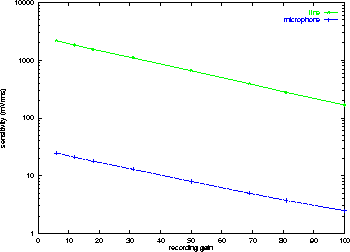
The recording gain rounds to the following values: 0 2 8 14 20 26 32 38 44 50 56 62 68 74 80 85 91 97 103 109 115 121 127 133 139 145 151 157 163 169 174 180 186 192 198 204 210 216 222 228 234 240 246 252 255
For some systems (SS20/Solaris, others?), the recording gains are: 15 31 47 63 79 95 111 127 143 159 175 191 207 223 239 255

For the microphone input with full gain (100), it takes a sine input with 2.5 mVrms to create a 0 dB digital output. For line input, it takes 168 mV. The gain-to-sensitivity curve is exactly logarithmic. Note that the microphone input sensitivity is not high enough for dynamic microphones and barely enough for standard condenser microphones a few inches away from the speaker's mouth.
audio_u2s() translates mu-law into the range -32124 to
32124 (full 16 bits) rather than the actual 13-bit range.
The BSD (Berkeley) audio driver written by Van Jacobson does not have a control device. Thus, if we can't open the control device, we just use the regular audio device. If the control device is unavailable, the audio settings are stored until the audio device is opened and then set.
The sample_rate, channels, precision, and encoding fields are treated as read-only for /dev/audioctl, so that applications can be guaranteed that the existing audio format will stay in place until they relinquish the audio device. AUDIO_SETINFO will return EINVAL when the desired configuration is not possible, or EBUSY when another process has control of the audio device.
Once set, the following values persist through subsequent open() and
close() calls of the device: play.gain, record.gain,
play.balance, record.balance, output_muted, monitor_gain, play.port, and
record.port. All other state is reset when the corresponding I/O stream
of /dev/audio is closed.
SIGPOLL handling is slow and may lead to overflow cycles feeding on themselves; thus, we disable the SIGPOLL handling if 'track' is zero. Also, when there is a device error (over/underflow), we do not update the application state. The latter has the unfortunate consequence that once an error has occured, outside changes are no longer tracked. The ability to reset the error indicator is needed.
The .error flag needs to be explicitly reset with AUDIO_SETINFO.
The microphone jack provides 5 V DC to both channels (tip and sleeve).
These systems will not read from the audio device if it is opened
with O_RDWR. Thus, we need to maintain two separate file
descriptors, one for reading and another for writing.
The SPARCstation 5 has to open the audio device O_RDWR,
otherwise setting values will yield an EINVAL error. For the first
400,000 samples (for PCMU), reading seems to happen in spurts of about
8192 bytes, but then the system 'catches itself' and continues normally.
This is visible in a rather sluggish VU meter display.
Precision=16 only works with AUDIO_ENCODING_LINEAR;
otherwise precision=8 remains unchanged.
The following combinations of encodings, sampling rates and precision are possible:
| encoding | sample_rate | precision | channels |
| ALAW/ULAW | 8000 | 8 | 1 |
| LINEAR | any | 16 | 1 or 2 |
sun/audioio.h is replaced by sys/audioio.h, which also needs <sys/types.h>. Use multimedia/audio_device.h instead. (Under /usr/demo/SOUND/include or /usr/demo/SOUND.)
The AUDIO_GETDEV return value differs: instead of an int, it is a structure of text fields.
On Solaris, signal() has the property "the system first
sets the signal's disposition to SIG_DFL before executing the signal
handler" (signal(2)). In other words, SVR4 implementes old-style
unreliable signals. This causes a small race condition, in that
additional SIGPOLLs are not caught and trigger SIG_DFL (which for
SIGPOLL is exit(), with the error message "Stream I/O possible").
Thus, we use sigaction() with the appropriate flags. See
also Stevens, Advanced Programming in the UNIX
Environment, p. 298.
#ifdef AUDIO_DIAG_LOOPBACK can be used to test for
advanced features like 'buffer_size' and 'balance' fields.